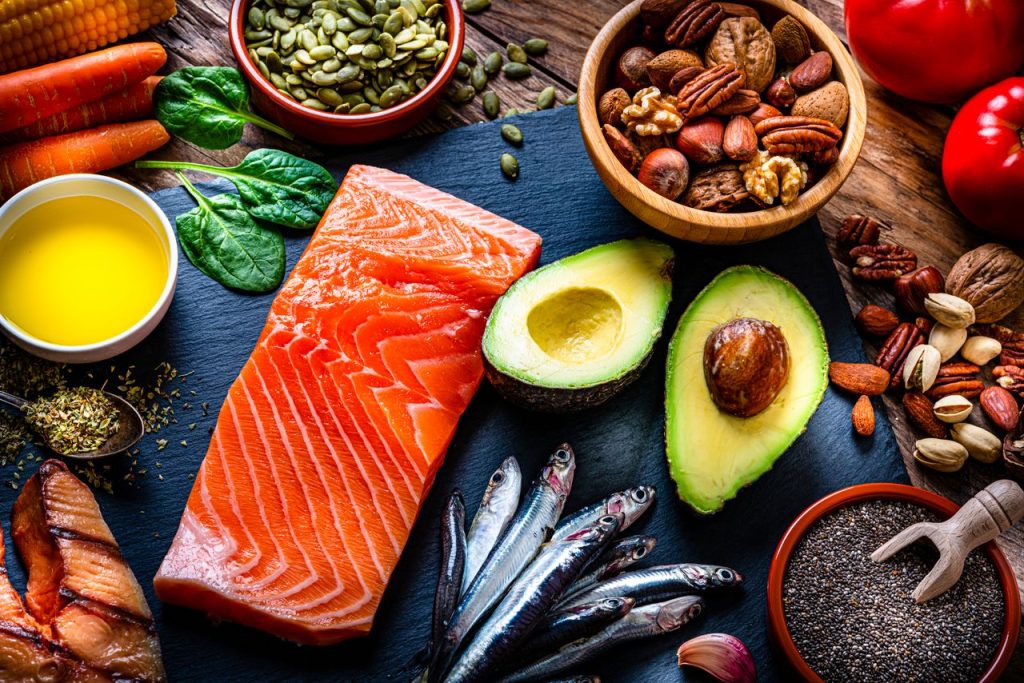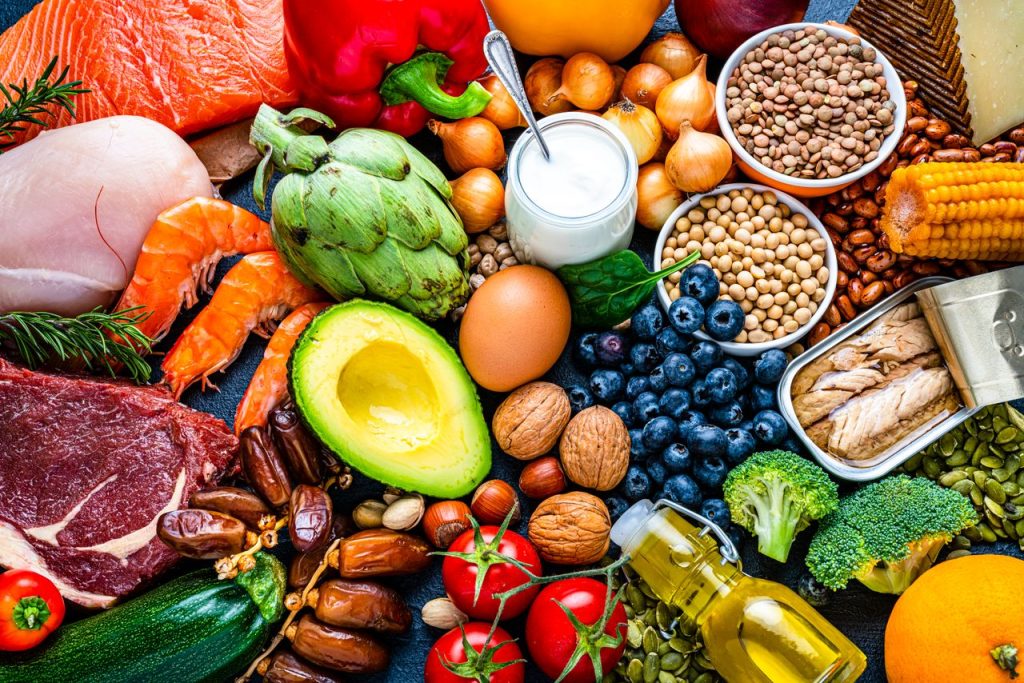
What Happens When You Don’t Eat Enough Fat?


What Happens When You Don’t Eat Enough Fat?
Fat isn’t just an optional part of your diet—it is vital in maintaining your overall health. So, what happens if you don’t eat enough fat? When you skimp on this essential macronutrient, you could miss out on the numerous benefits of fats.
Part 1 of this series explored whether eating fat can make you fat. In this article, we will explore the incredible functions of dietary fats and explain why it’s important not only to include fat in your meals but to choose the right types for your needs.
6 Important Functions of Fat
Fat isn’t just something you can leave out. It’s critical for your body. Let’s look at some amazing things it can do for you.

Mitigates Your Blood Sugar Response to a Meal
Eating fat as part of your meals containing carbohydrates can help stabilize your blood sugar response if you already have normal blood sugar levels. Fat slows down the digestion and absorption of carbohydrates, smoothing out the spikes in blood sugar.
By creating a more gradual release of glucose into your bloodstream, fat can help maintain steady energy levels and reduce the likelihood of post-meal energy crashes. Additionally, less blood sugar fluctuations support better metabolic health, curb cravings, and may reduce the risk of developing insulin resistance over time.
Even with this benefit, you don’t want to overdo it. A study investigated how varying amounts of fat affect glycemic responses when added to carbohydrates. Twelve healthy subjects consumed 50g of carbohydrates with varying fat amounts (0, 5, 10, 20, or 40g).
With 40 grams of fat, blood sugar peaks dropped by 38%, and the total blood sugar rose by 30%. Notably, even with just 5 grams of fat, participants experienced a drop in blood sugar peaks of 17% and a total blood sugar rise of just over 15%, which is more than half the reduction seen with 40 grams. The effect wasn’t linear—small amounts of fat have a strong impact, but the benefit levels off as fat intake increases.
Additionally, varying fat intake between 17% and 44% of daily calories didn’t significantly affect blood sugar responses, suggesting a limit to fat’s influence on blood sugar control. So, adding as little as 5 grams of fat to a meal can help lower blood sugar spikes and the overall rise in blood sugar.
It’s important to note that glycemic response is very individual. Researchers are now discovering that we may all respond differently to carbohydrates, fats, and proteins.
A study examined insulin release in response to carbohydrates, proteins, and fats using islets (clusters of insulin-producing cells in the pancreas) from 140 human donors. The goal was to understand differences in how people release insulin and identify molecular factors affecting this response.
Most donors’ islets responded most strongly to carbs, moderately to protein, and mildly to fat. However, some donors had a stronger insulin response to proteins or fats than to carbs. These findings suggest that nutrition should be personalized based on how your body responds to different macronutrients.
Learn how to personalize your nutrition based on your unique physiology, genetics, gut biome, and health goals so that you never have to diet again with The Ultimate Nutrition Bible.
Helps You Feel Fuller Longer

Unlike carbs, which your body can quickly digest, spike insulin, and leave you hungry soon after, fats help you feel fuller longer by taking longer to digest. This prolonged digestion time keeps food in your stomach, leading to a gradual release of energy that helps maintain satiety.
Fat is particularly good at suppressing appetite because it stimulates the release of satiety hormones like cholecystokinin (CCK). When fat-rich food reaches the small intestine, CCK is released and sends signals to the brain via the vagus nerve, telling your body to stop eating. CCK helps by making the stomach contract and activating brain areas like the hypothalamus, which reduces hunger.
While we will discuss the different types of fat more later, a study explored how fat saturation affects satiety—the feeling of fullness and satisfaction after eating, which signals to the body that it no longer needs food.
Researchers divided 40 participants, all of normal weight, into two groups. In the first phase, participants consumed one of three fat types: monounsaturated, polyunsaturated, or saturated fat, as 55% of their total caloric intake.
Those eating polyunsaturated fat, like those found in fatty fish, stayed fuller longer than those who ate saturated or monounsaturated fat.
In addition to taking longer to digest, eating fat can help you feel fuller longer by stimulating the release of hormones like leptin, signaling to your brain that you’re full and reducing feelings of hunger.
A review of studies again highlighted polyunsaturated omega-3s, like those found in fish and algae oils. Researchers found that in overweight individuals, consuming omega-3s can increase leptins, which helps you feel full and may prevent overeating.
However, eating other fats or being of normal weight may produce a different result. A study explored the impact of dietary fat composition on serum leptin concentrations in healthy men and women. Researchers divided 55 participants into groups and assigned diets enriched with olive oil, rapeseed oil, or sunflower oil.
While rapeseed oil slightly increased leptin in men, it decreased leptin levels in women. Those consuming olive and sunflower oil didn’t experience any changes in leptin levels.
It’s important to note that if you are looking for satiety, while including fat in your meals will help, it still doesn’t beat protein.
A study tested whether a high-protein yogurt snack could improve appetite control and reduce food intake compared to high-fat snacks like crackers and chocolate. Twenty healthy women participated in a randomized crossover trial with three 8-hour test days. Each day, they consumed one of the 160-calorie snacks after a standardized breakfast and lunch, with hunger and fullness tracked until dinner.
Results showed that the high-protein snack reduced afternoon hunger more effectively than the high-fat option delayed the onset of eating compared to both high-fat snacks, and led to fewer calories consumed at dinner.
Read this article if you’re curious whether low-fat or low-carb is better for weight loss.
Helps You Absorb Vitamins

Fat helps you absorb fat-soluble vitamins—A, D, E, and K—by enabling their transport through the digestive system. These vitamins dissolve in fat, and once consumed, fat in your diet breaks them down into smaller molecules. Many beneficial plant substances like polyphenols are also fat-soluble and best consumed with fat. This process allows the walls of the small intestine to absorb the molecules and will enable them to enter the bloodstream.
Dietary fat allows your body to absorb these essential vitamins efficiently, without which could lead to deficiencies even if you’re consuming adequate amounts of the vitamins themselves.
Gives You Energy
Fat is a major fuel source for your body, providing longer-lasting energy than carbs. When you consume dietary fat, your body breaks it into fatty acids and glycerol, which enter your bloodstream.
These fatty acids are transported to cells and undergo beta-oxidation, converting them into acetyl-CoA. The mitochondria – the “powerhouses” of your cells – use this acetyl-CoA to generate ATP, the body’s primary energy currency. Since fat is energy-dense, offering nine calories per gram, it supplies sustained energy, making it especially valuable for long periods of low to moderate activity or when carbohydrate stores are depleted.
This is why fat is a key energy reserve in the body, helping to fuel endurance activities and maintain energy levels between meals.
If you’re keto-adapted, this process happens more readily. Whereas, certain fat-soluble toxins from common personal-care products and the environment can change fat metabolism towards more fat accumulation and less fat usage.
Hormone Production

Getting fat in your diet is critical for healthy hormone production. Fat is the building block of hormones, and ensuring you include healthy dietary fat helps with hormone balance.
A study explored the relationship between dietary fat intake, hormone levels, and the risk of occasional lack of ovulation in over 250 regularly menstruating women. Researchers measured women’s hormone levels up to eight times per cycle over two cycles. Participants provided a 24-hour dietary recall per cycle.
After adjusting for variables like energy intake, age, BMI, and race, researchers determined that higher total fat intake was associated with increased total and free testosterone levels, with polyunsaturated fatty acids specifically linked to elevated testosterone. Additionally, docosapentaenoic acid, an omega-3 fatty acid primarily found in fatty fish and seafood, was associated with higher progesterone levels and a reduced risk of lack of ovulation.
Another study examined the relationship between fat intake and testosterone levels in men. Over 2,500 men provided fasting blood samples and completed food records to estimate their dietary intake. Researchers found that higher saturated fatty acid intake, when replacing protein, was associated with slightly elevated serum-free and total testosterone concentrations.
Brain and Eye Health

A healthy brain and clear vision require a good dose of healthy fats. Long-chain omega-3 fatty acids, found in fish, seafood, algae, and grass-fed meats, are particularly beneficial for enhancing brain function and structure, especially in older adults. They’re also key components of your brain cells.
These omega-3 polyunsaturated fatty acids also play a crucial role in modulating microglia, the brain’s immune cells, which are essential for neuroimmunology and overall brain health. Additionally, dietary fats, particularly polyunsaturated fats like omega-3 and omega-6, are vital for maintaining cell membrane integrity and supporting various brain functions.
They contribute to producing signaling molecules that influence cognitive function and mood, making healthy fats an indispensable part of a balanced diet for optimal brain health.
Your vision health also depends on fat intake. Your eyes contain fatty acids crucial for the retina to process light signals and communicate with the brain. Omega-3 long-chain polyunsaturated fatty acids are important for maintaining healthy ocular fatty acid content.
Studies using experimental diets in rats have shown that dietary omega-3 can alter the spatial organization of fatty acids in the retina, indicating a direct impact on retinal health.
Conclusion
Dietary fat is essential for maintaining overall health, influencing everything from blood sugar regulation to hormone production and brain function. Insufficient fat intake can lead to various health issues, increasing your risk of vitamin deficiencies, hormonal imbalances, and compromised energy levels.
If you tend to feel uncomfortable after eating a lot of fat, consider taking kApex with meals. This advanced enzyme supplement is designed to help digest fats and proteins more effectively.
To ensure you’re making informed choices about your nutrition, consider The Ultimate Nutrition Bible. This comprehensive guide, developed from over 50 years of combined experience and scientific research, helps you create a personalized diet tailored to your unique physiology, genetics, gut biome, and health goals. Say goodbye to one-size-fits-all diet plans and embrace a sustainable way of eating designed just for you.
References
- Owen B, Wolever TMS. Effect of fat on glycaemic responses in normal subjects: a dose-response study. Nutr Res. 2003;23(10):1341-1347. doi:10.1016/s0271-5317(03)00149-0
- Kolic J, Sun WG, Cen HH, et al. Proteomic predictors of individualized nutrient-specific insulin secretion in health and disease. Cell Metab. 2024;36(7):1619-1633.e5. doi:10.1016/j.cmet.2024.06.001
- Gibbons C, Finlayson G, Caudwell P, et al. Postprandial profiles of CCK after high fat and high carbohydrate meals and the relationship to satiety in humans. Peptides. 2015;77:3-8. doi:10.1016/j.peptides.2015.09.010
- Lawton CL, Delargy HJ, Brockman J, Smith FC, Blundell JE. The degree of saturation of fatty acids influences post-ingestive satiety. Br J Nutr. 2000;83(5):473-482.
- Gray B, Steyn F, Davies PSW, Vitetta L. Omega-3 fatty acids: a review of the effects on adiponectin and leptin and potential implications for obesity management. Eur J Clin Nutr. 2013;67(12):1234-1242. doi:10.1038/ejcn.2013.197
- Kratz M, von Eckardstein A, Fobker M, et al. The impact of dietary fat composition on serum leptin concentrations in healthy nonobese men and women. J Clin Endocrinol Metab. 2002;87(11):5008-5014. doi:10.1210/jc.2002-020496
- Ortinau LC, Hoertel HA, Douglas SM, Leidy HJ. Effects of high-protein vs. high- fat snacks on appetite control, satiety, and eating initiation in healthy women. Nutr J. 2014;13(1). doi:10.1186/1475-2891-13-97
- Reddy P, Jialal I. Biochemistry, fat soluble vitamins. In: StatPearls. StatPearls Publishing; 2024.
- Jackson E, Shoemaker R, Larian N, Cassis L. Adipose tissue as a site of toxin accumulation. Comprehensive Physiology. 2017;7(4):1085-1135. doi:10.1002/cphy.c160038
- Mumford SL, Chavarro JE, Zhang C, et al. Dietary fat intake and reproductive hormone concentrations and ovulation in regularly menstruating women. Am J Clin Nutr. 2016;103(3):868-877. doi:10.3945/ajcn.115.119321
- Wynne-Ellis MM, Mursu JJ, Tuomainen TP, Bertone-Johnson E, Salonen JT, Virtanen JK. Dietary fat quality and serum androgen concentrations in middle-aged men. Eur J Clin Nutr. 2024;78(2):99-106. doi:10.1038/s41430-023-01358-9
- Chianese R, Coccurello R, Viggiano A, et al. Impact of dietary fats on brain functions. Curr Neuropharmacol. 2018;16(7):1059-1085. doi:10.2174/1570159×15666171017102547
- Vidal E, Jun B, Gordon WC, et al. Bioavailability and spatial distribution of fatty acids in the rat retina after dietary omega-3 supplementation. J Lipid Res. 2020;61(12):1733-1746. doi:10.1194/jlr.ra120001057
